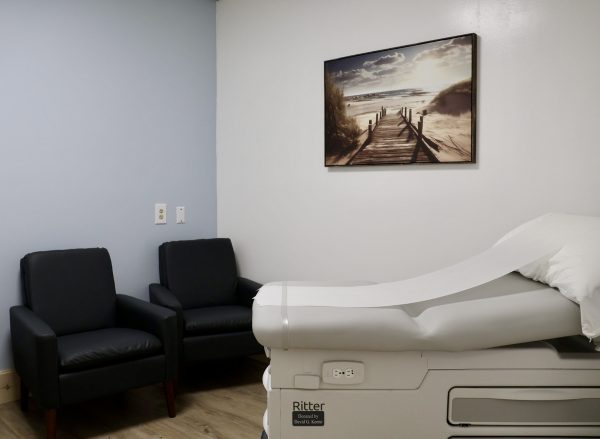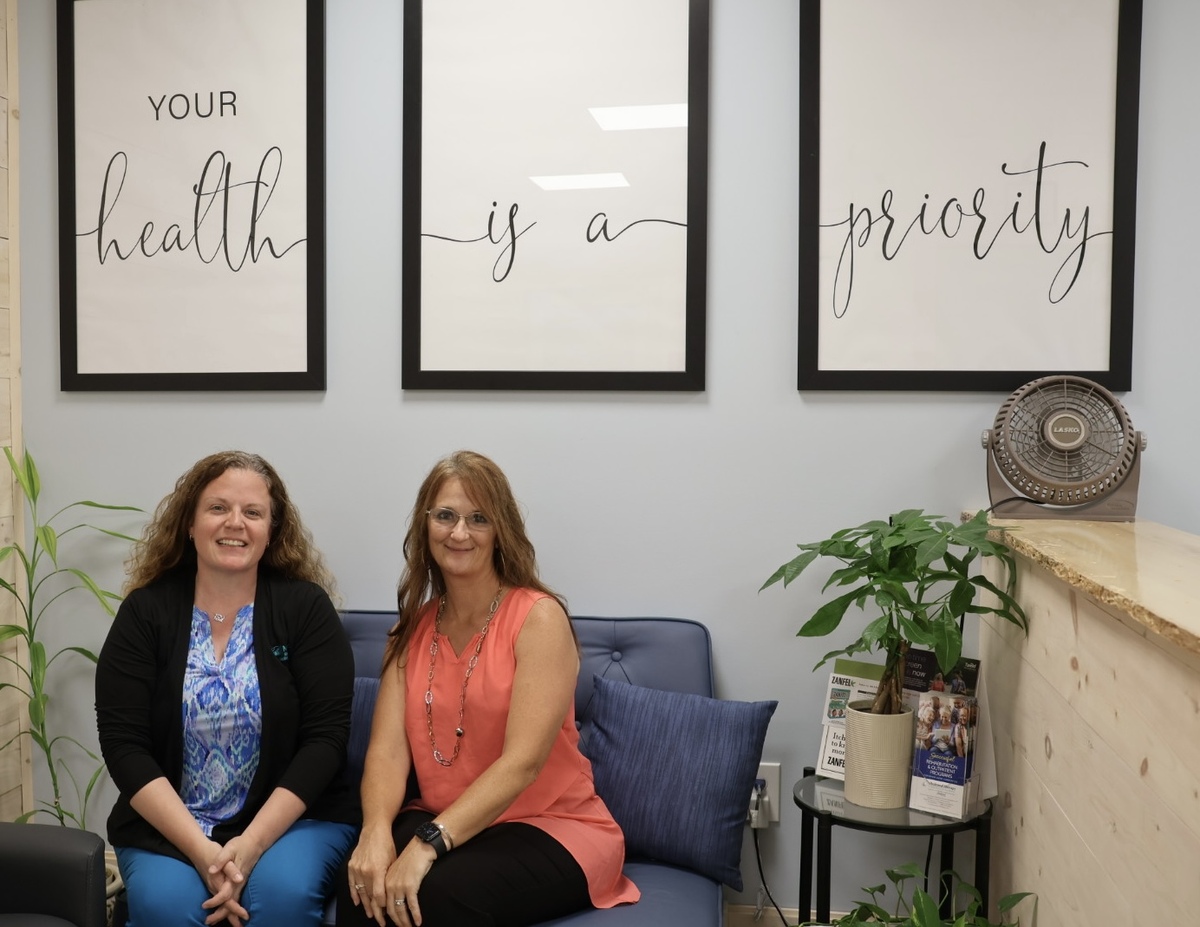As the biggest health care organization serving eastern and northern Maine continues to reel from financial challenges, some of its employees are striking out on their own.
Two pairs of former Northern Light Health nurses have opened independent clinics this summer using a model called direct primary care that’s growing in popularity in Maine and beyond.
They take smaller patient loads for a flat monthly fee instead of billing insurance, and offer primary care services with easier scheduling and more time to spend in appointments than their former systems allowed.
The model is a response to problems facing health care as a whole, providers say, and they argue it can fill gaps in the traditional system while offering preventative care. It comes as Maine struggles with a shortage of health care professionals on top of systemic problems that have most recently driven the state to study the possibility of opening a new medical school.
Parts of almost every Maine county have a shortage of primary care providers, according to the federal Rural Health Information Hub. The National Center for Health Workforce Analysis predicts a national shortage of 87,000 primary care physicians by 2037.
Currently, Mainers sometimes wait years to get primary care providers, and when they do, those providers might be responsible for more than 1,500 patients and able to spend about 20 minutes with each one.
It’s not clear that the new models of direct primary care will help address those care shortages. National studies have found they can make them worse, as independent practitioners don’t take on as many patients as hospital system employees.
But the growing strain on traditional medical practices has put more work on the remaining staff, who face greater likelihood of burnout, former nurses said. Combined with other challenges including insurance requirements and extensive recordkeeping, they might have left the field altogether if they didn’t open their own practices.
“I think we spent most of our careers checking boxes to make sure that quality ‘measures’ were met, and it didn’t give us the opportunity from our nursing background, which is very holistically based,” said Jackie Carter, a family nurse practitioner who left Northern Light last month to start an independent practice in Orland with her coworker Corinne Malenfant. “It’s head to toe, it’s mind, body, spirit.”
For example, if a patient won’t accept a procedure, Carter can now ask why and try to address underlying reasons instead of just marking that they refused it, she said.
 At School House Health in Orland, Corinne Malenfant and Jacqueline Carter want to offer more “old school” and personal health care. At a troubled time for health care in Maine and beyond, they say the switch has brought joy back into their practice. Credit: Elizabeth Walztoni / BDN
At School House Health in Orland, Corinne Malenfant and Jacqueline Carter want to offer more “old school” and personal health care. At a troubled time for health care in Maine and beyond, they say the switch has brought joy back into their practice. Credit: Elizabeth Walztoni / BDN
Each has roughly three decades of experience in the medical field, and until July 1 they were full-time providers working in family medicine at the system’s Blue Hill location.
They joked about going into practice themselves at stressful times, but then Carter watched another Maine provider on social media document her own journey into direct primary care. Soon, the two were forming an LLC and renovating a space in the Orland Community Center for the practice they named School House Health.
The more personal model of direct primary care, where they can get to know their patients well, also appeals to both of them.
“My love is family medicine,” said Malenfant, who grew up in Bucksport and said caring for her community has been her ultimate goal. “I love the fact that you look after a whole family unit and that you get to know people from the grandchildren to, sometimes, even great grandparents.”
School House Health offers a full spectrum of primary care, including immunizations, women’s health exams, child wellness visits, blood sugar tests, urine tests, biopsies and tests for the flu, COVID-19 and strep. The two can order prescriptions and make referrals.
Monthly fees start at $50 for children and scale up by age after an enrollment fee, with people in their 30s and 40s paying $75 per month and seniors billed $130.
The clinic accepts Medicare Part B but otherwise won’t bill insurance, though health savings accounts will cover direct primary care memberships for more people under a new federal bill going into effect at the start of 2026.
Alley and Brad Tuttle, who opened Apotheosis Health in Bangor in June after leaving Eastern Maine Medical Center, don’t accept insurance at all.
They have heard some criticism of their monthly fees, Brad Tuttle said. Members pay from $90 per month as a single adult to $220 monthly for a four-person family for primary care services, IV infusions and urgent care visits with 24/7 access to the couple.
But he views it as a higher quality of preventative care that’s more comprehensive and available — for example, they can provide a quick response to photos of a skin condition or an immediate prescription refill.
The shortage of primary care providers meant that Alley Tuttle spent much of her time as a nurse practitioner in oncology trying to manage basic health problems instead of focusing on specialist care, she said. For example, patients might not be able to get a scan they needed because of their blood pressure or blood sugar but couldn’t find a primary care provider to help them manage it.
Her husband also worked there and said that at least a third of their patients lacked primary care providers and would call their oncologist instead.
If a patient did eventually find a provider, he said, they might never even see them. He noticed that high patient loads burned nurses out, sometimes leading them to leave within a year.
Others have criticized direct primary care for not suiting patients with more complex health needs. The couple counters that the faster appointment scheduling, longer visits and flexible times serve them better.
Steve Michaud, the president of the Maine Hospital Association, told the Maine Monitor last month that direct primary care is a good option but “doesn’t do much for those that can’t afford it.”
But Carter said their practices are designed for uninsured or underinsured people, unlike the high-end “concierge medicine” their model is sometimes confused with.
The model clearly appeals to some Mainers who are frustrated or underserved by traditional health care.
In its first seven days, School House Health signed up 130 patients, several from as far away from Old Town. Some of the newcomers said they had been on waiting lists to get a primary care provider for three years.
Apotheosis Health is aiming for around 500 patients; Carter and Malenfant have a starting goal of 300 each.
The Tuttles also felt increasingly constrained by insurance in their previous jobs and limited by what the companies would approve.
“[It was] very eye-opening,” Brad Tuttle said. “Both of us always wanted to do something, because the need is so great up here that you can really make a difference.”
Not accepting insurance could also make their practice more sustainable in the face of cuts to federal insurance programs, they told the Monitor.
In recent years, Northern Light has made headlines for severe financial losses, closing its hospital in Waterville, ending services, warning of future staffing cuts and most recently an insurance contract dispute that could leave 30,000 Mainers uninsured. It’s not the only health care system in Maine that’s making cuts, although its challenges have been particularly acute.
Malenfant argued that the traditional medical system is broken overall, with the effects most clear in rural northern Maine where resources are spread out and fewer new professionals are attracted to work.
The new model has brought joy into practice again for Carter and Malenfant, they said, and those who have tried it don’t want to go back. Carter sees the challenges as a necessary step to improve existing systems.
“We can’t change health care without the challenge,” she said, quoting Loretta Ford, who created the first nurse practitioner program in the 1960s.

